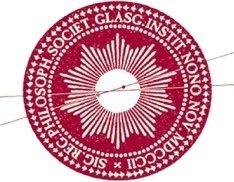Overview
A good summary of the history of the Wellington Church can be found on the Discover Glasgow website:
‘The Wellington United Presbyterian Church congregation gained its name from their original church that was located on Wellington Street in the city centre. That church, completed in 1827 and designed by John Baird, served the congregation for fifty years.
By this time their membership numbers had expanded beyond the church’s capacity, and so a competition was held for the design of a new one, with Thomas Lennox Watson beating out John Burnet. A suitable site was found on University Place, opposite the University of Glasgow’s main building which had moved west the decade before […]
While Baird’s original church was demolished in 1909, the current Wellington Church is still very active […].’
(‘Wellington Church’, Discover Glasgow <http://www.discoverglasgow.org/religious-wellington/4573943352> [accessed 01/04/18]).
A brief history of the church’s Literary Association comes from Alexander Fleming’s, Historical Sketch of Wellington United Presbyterian Congregation, Glasgow (1792-1892) (1893). According to this account, in 1839, a group of young men from the congregation formed The Young Men’s Mutual Improvement Association, which was to be short-lived. The group was revived in 1851, and, at the time of publication, was still running as the Literary Association.
The 1892 Constitution for this society sets out the group’s object as its members’ moral and intellectual improvement. While the earlier group was exclusively for young men, in the late nineteenth century, the association accepted both young men and women as members. The annual subscription charge was quite low, being only 1s, as compared to the average for other literary societies during this period (2s 6d). The meetings were held at 8pm in the Library Room of Wellington Church, which was just around the corner on Ann Street (now known as Southpark Avenue), Hillhead. In March 1892, there was a total of 58 members, which grew to 132 in 1896.
This association was very active in its participation with the literary culture of the period by hosting joint meetings and itself taking part in other literary societies’ meetings across the city (see ‘Additional Notes’ below). In 1900, the group became the Wellington United Free Church Literary Association.
Date of Existence
1851-?
Source of Information
1. Mitchell, James, Lecture on the principles of the Secession Church: delivered to the Young Men’s Mutual Improvement Association, in connection with Wellington Street Congregation, Glasgow, on 12th May, 1863 (UGSC, Sp Coll T.C.L. 4126);
2. Jubilee of the United Presbyterian Church, Wellington Street, Glasgow. Report of Services (Glasgow: Aird & Coghill, 1878); see ‘Report of Congregational Meeting, on 21st November, 1877 in Wellington Street Church, in Connection with the Jubilee Celebration’ (GCA, CH3/1238/1-2);
3. Wellington United Presbyterian Church, Literary Association [Fifth] Minute Book, 1892-1896 (GCA, CH3/1238/1-2);
4. Fleming, Alexander, Historical Sketch of Wellington United Presbyterian Congregation, Glasgow (1792-1892), with an Account of the Proceedings in Connection with the Celebration of the Centenary of the Congregation and of the Rev. Dr. Black’s Semi-jubilee as its Minister (Glasgow: Maclure, Macdonald & Co., 1893) (MLSC, Mitchell (GC) 285.241443 WEL 475664);
5. Report of Wellington United Free Church, Glasgow, for the Year Ended 30th September, 1901 (GCA, CH3/1238/1);
6. Report and year book, Wellington United Free Church (Glasgow: [The Church]); Notes from the Mitchell Library online catalogue: GC: 1905/06-1919/20, 1921/22-1926/27; 285.241443 (MLSC, Mitchell (GC), 285.241443 WEL 575166)
Repository
Glasgow City Archives (GCA)
Mitchell Library Special Collections (MLSC)
University of Glasgow Special Collections (UGSC)
Reference Number
(See Source of Information)
Additional Notes
See also Langside (Literary) Society, St. Columba Literary Association, St. Stephen’s Literary Association, College U.F. Church Literary Society, Berkeley Street U.P. Church Literary Association, Free St. Matthew’s Y.M.C. Union, St. Columba’s Literary Association, Sandyford Church Literary Association [aka Sandyford Established Association], and Free College Church Association, with whom this society had a least one joint meeting.
